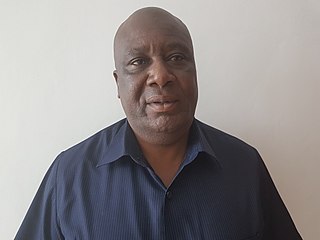
Ali Hassan Mwinyi was a Tanzanian politician who served as the second president of the United Republic of Tanzania from 1985 to 1995. Previous posts included Minister for Home Affairs and Vice President. He also was chairman of the ruling party, the Chama Cha Mapinduzi (CCM) from 1990 to 1996.
The Certificate of Secondary Education (CSE) was a subject-specific qualification family awarded in both academic and vocational fields in England, Wales and Northern Ireland. CSE examinations were held in the years 1965 to 1987. This qualification should not be confused with the Indian Certificate of Secondary Education which is a school-leaving qualification in India. Also, in some African and former British colonial countries there is a qualification named the Certificate of Secondary Education based on the original and former British variant. Also, the CSE should not be confused with the African qualification CSEE.
The Kenya Certificate of Primary Education (KCPE) was a certificate awarded to students after completing the approved eight-year course in primary education in Kenya. The examination was supervised by the Kenya National Examination Council (KNEC), an examining body in Kenya under the Ministry of Education. The same body also conducted and regulated the Kenya Certificate of Secondary Education (KCSE), a certificate awarded to students after completing secondary education. KCPE and KCSE were both started in 1985 when the 8-4-4 system of education was introduced in Kenya.The last KCPE examination, under this system was done on November 1, 2023 at 11am. These exams were replaced by KPSEA.

Education in Tanzania is provided by both the public and private sectors, starting with pre-primary education, followed by primary, secondary ordinary, secondary advanced, and ideally, university level education. Free and accessible education is a human right in Tanzania. The Tanzanian government began to emphasize the importance of education shortly after its independence in 1961. Curriculum is standardized by level, and it is the basis for the national examinations. Achievement levels are important, yet there are various causes of children not receiving the education that they need, including the need to help families with work, poor accessibility, and a variety of learning disabilities. While there is a lack of resources for special needs education, Tanzania has committed to inclusive education and attention on disadvantaged learners, as pointed out in the 2006 Education Sector Review AIDE-MEMORE. The government's National Strategy for Growth and Reduction of Poverty in 2005 heavily emphasized on education and literacy.

St. Joseph's College, Nainital is a day boarding and residential school in Nainital, Kumaon, India, providing private school education.
The Secondary School Leaving Certificate is a certification obtained by a student on successful completion of an examination at the end of study at the secondary schooling level in India. The SSLC is obtained on passing the grade 10 public examination, which is commonly referred to as 'class 10 board examinations' in India. SSLC is a common eligibility examination popular in many states in India, especially Kerala, Karnataka, and Tamil Nadu. The SSLC is also called Secondary School Certificate (SSC) in Andhra Pradesh, Telangana, Maharashtra and also as High School Certificate (HSC) in Madhya Pradesh and also as Matriculation in many states of India.
Higher Secondary Certificate (HSC), Higher Secondary School Certificate (HSSC) or Higher Secondary Education Certificate (HSEC) is a secondary education qualification in Bangladesh, India and Pakistan. It is equivalent to the final year of high school in the United States and GCSE and/or A level in the United Kingdom.

The A-level is a subject-based qualification conferred as part of the General Certificate of Education, as well as a school leaving qualification offered by the educational bodies in the United Kingdom and the educational authorities of British Crown dependencies to students completing secondary or pre-university education. They were introduced in England and Wales in 1951 to replace the Higher School Certificate. The A-level permits students to have potential access to a chosen university they applied to with UCAS points. They could be accepted into it should they meet the requirements of the university.

The O-Level is a subject-based qualification conferred as part of the General Certificate of Education. It began in the United Kingdom and has been adopted, often with modifications, in several other countries.
Kibaha Secondary School is a Tanzanian all-boys secondary school located in Kibaha, Kibaha District, Pwani Region.
The Junior School Certificate (JSC) was a public examination taken by students in Bangladesh after successful completion of eight years of schooling. It was introduced in 2010. It is followed by the Secondary School Certificate (SSC).
Chhattisgarh Board of Secondary Education is a board of education in the state of Chhattisgarh, India. CGBSE is a state agency of the Government of Chhattisgarh, it is responsible for promotion and development of secondary education in Chhattisgarh. The Board has conducted its exams independently from the year 2002, and conducts High School, Higher Secondary and Diploma Courses.
The National Institute of Open Schooling (NIOS), formerly National Open School is a national level board of education in India, controlled and managed by the Government of India. It was established by the Ministry of Education of the Government of India in 1989.

Alphaxard Kangi Ndege Lugola was a Tanzanian politician and current Member of Parliament for Mwibara constituency since 2010. He is also member of the ruling party Chama Cha Mapinduzi (CCM).
The Basic Education Certificate Examination (BECE) is the main examination to qualify students for admission into secondary and vocational schools in Ghana, and Nigeria. It is written after three years of junior secondary education. It is administered by the Ghana Education Service under the Ministry of Education. In Nigeria, it is administered by the state ministry of education in each state under the supervision of the National Examinations Council (NECO). NECO directly organizes examinations for Unity Schools, Armed Forces Secondary Schools, and other Federal Government schools. Candidates in the third year of junior high schools approved by the Ghana Education Service are eligible for the examination. It is conducted annually in June (Ghana and, May/June.
National Examinations Council of Tanzania is an agency of the Tanzanian government, headquartered in Dar Es Salaam, that proctors tests given nationally.

On 12 March 2020, all schools, colleges, and childcare facilities in the Republic of Ireland were shut down in response to the COVID-19 pandemic. The shutdown resulted in the cancellation of the 2020 Leaving Certificate and 2020–2021 Junior Certificate examinations, as well as all 2020–2021 Irish language summer courses in the Gaeltacht.
Beatus Kinyaiya, O.F.M. Cap. is a Catholic archbishop of Dodoma in Tanzania.

Wolfgang Pisa is a Tanzanian prelate of the Catholic church. A bishop of Lindi since 2022. Currently he is President of Tanzania Episcopal Conference (TEC) following the election on 22 June 2024.








